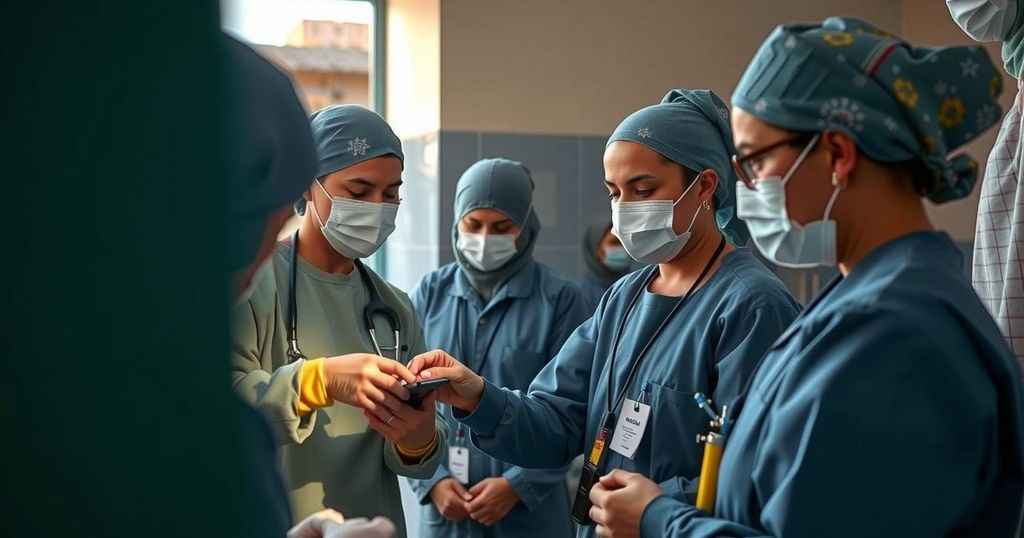In September 2023, a 6.8-magnitude earthquake in Morocco led to widespread destruction, with midwives from AMSF and the support of ICM responding to prevalent needs. They established mobile clinics in various regions, offering medical services and psychological support, including dignity kits for vulnerable families. As part of long-term planning, AMSF seeks additional training for midwives to improve responses to future crises, reinforcing the essential role of midwifery in humanitarian action.
In September 2023, a catastrophic earthquake struck Morocco, registering a magnitude of 6.8 and inflicting severe damage especially in the rural regions of the Atlas Mountains. This natural disaster resulted in over 2,900 fatalities and more than 5,500 injuries, with pregnant women facing heightened vulnerabilities as they grappled with the chaos that ensued. In response to this urgent humanitarian crisis, midwives from the Association Marocaine des Sages-Femmes (AMSF), with the support of the International Confederation of Midwives (ICM), mobilized to provide essential care and assistance to affected communities. Mobile medical clinics were established, funded by Direct Relief, operating across several impacted areas, including Saidate, Tighdouine, Zerkten, Onein, and Timzdagiouine. A sixth caravan, developed in collaboration with ICM, specifically targeted Ouirgane in the Province of Al Haouz, a region in dire need of healthcare services. On January 13, 2024, AMSF midwives, alongside doctors and nurses, delivered health services to 169 individuals in Ouirgane, offering prenatal care, general medical consultations, and screenings for various health conditions. In addition to providing medical services, the midwives distributed dignity kits, newborn essentials, and winter clothing to vulnerable families impacted by the disaster. For patients requiring specialized care, the midwives coordinated referrals to higher-tier medical facilities, including Marrakech University Hospital. Furthermore, the midwives extended psychological support to women affected by the earthquake, conducting both individual and group therapy sessions to assist those dealing with trauma and grief. They also offered counseling for women who had experienced gender-based violence, underscoring the multifaceted and compassionate role midwives play in their communities. Faced with the challenge of accessing remote areas devastated by the earthquake, the AMSF midwives leveraged their strong local connections to ensure that assistance reached the most vulnerable populations. Looking ahead, AMSF and ICM are proactively preparing for future emergencies, advocating for enhanced training for midwives. ICM has initiated the “Ready to Respond: A Midwife’s Guide to Humanitarian Action” program, aimed at equipping midwives with the skills necessary to react effectively in crisis situations. In May 2024, a three-day Train the Trainer (ToT) program was hosted by ICM in Rabat, wherein AMSF midwives were instructed on assessing crisis needs, managing newborn care in emergencies, and advocating for the inclusion of midwives in national disaster response strategies. This specialized training aims to bolster community health and advocate for robust health systems during future disasters. The collaboration among Direct Relief, ICM, and AMSF exemplifies the vital leadership that midwives can provide in crisis situations. As the earthquake-affected communities work towards recovery, the steadfast commitment of these midwives serves as a beacon of hope and support for the individuals relying on them.
In Morocco, a significant earthquake occurred in September 2023, resulting in considerable human and infrastructural losses. Earthquakes pose serious health risks, particularly for vulnerable populations such as pregnant women. The involvement of midwives is critical in providing maternal and newborn health care, especially during emergencies. The Association Marocaine des Sages-Femmes (AMSF) partnered with the ICM and received support from organizations like Direct Relief to initiate emergency response action, illustrating the importance of professional midwifery in disaster scenarios and the ongoing needs for such interventions in rural areas.
In conclusion, the efforts of midwives in Morocco following the devastating earthquake exemplify the indispensable role they play in humanitarian crises. They not only delivered essential medical care and psychological support but also actively contributed to the community’s resilience and recovery. This partnership between Direct Relief, ICM, and AMSF highlights the pressing need to prepare midwives for future emergencies, ensuring that they can continue to provide vital support in times of crisis. The ongoing training initiatives and community engagements reflect a commitment to enhancing health systems and safeguarding the well-being of vulnerable populations during disasters.
Original Source: internationalmidwives.org







